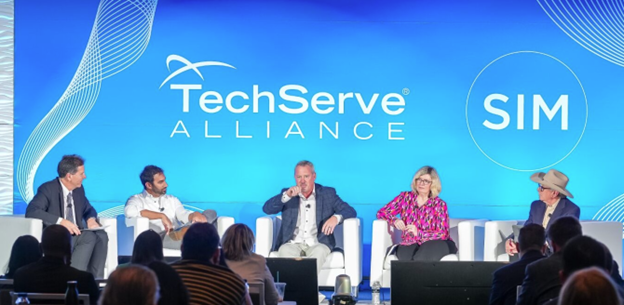Explore how generative AI is reshaping the staffing industry, the considerations for implementation, and innovative ways leading companies are leveraging AI for efficiency and effectiveness.
Artificial intelligence (AI) is creating groundswell changes in the way we all work. There are few working professionals – in any field – who aren’t already feeling the impact. And that impact will continue to expand.
What are the implications for staffing and recruiting companies? In a business that is so inherently human, and people-centric, what role does AI play today and into the future?
Rapid change is uncomfortable
Perhaps no technology has generated such a volume and range of reactions. At least not as quickly as AI has. There are people who believe that AI is too new, and too risky, for implementation. Others embrace the technology fully, and are eager to see its evolution.
In some ways, it can be truthfully said that the current ‘buzz’ is overblown. In truth, we’ve all been using AI technology for many years. The search engines we use to find information we need all employ machine learning. Voice-activated smart home devices also depend on AI. The technology is evolving and improving rapidly, certainly, but it’s been around us for years.
More specialized tools have also been available to staffing companies for some time. Tools that automate communication with candidates and clients when triggered by certain events, for example, and employ AI chatbots in the process.
These kinds of innovations have made staffing companies more efficient, allowing recruiting and sales staff to spend more time on more strategic and valuable tasks.
At the heart of a lot of the concern is the fear that AI will replace humans altogether, eliminating the work that professionals do.
We shouldn’t let this fear hold us back, said Kip Wright, chairman of INSPYR Solutions, during a keynote panel discussion at the 2023 TechServe Alliance Executive Summit on AI and its Implications for the Future of Recruiting and Work. In the end, we’d only be limiting ourselves. “The opportunities and the advantages far outweigh the risks. We shouldn’t scare ourselves away from something that could be helpful,” Wright added.

The key consideration, perhaps, is the stage in the workflow at which generative AI is employed. Swaroop Reddy, CIO with Omnicon Precision Marketing Group and a panelist at the Executive Summit session differentiates between ‘process-driven’ and ‘outcome-driven’ uses of AI.
Outcome-driven AI seeks to use the technology to produce a final product. It’s debatable whether that use has a valuable place in staffing, at least at present.
Process-driven AI, on the other hand, seeks to use AI to enable people to be more efficient, and produce better work. And it is that use that holds tremendous potential for staffing companies.
“AI will change the practical aspects of recruiting,” Wright said. “Using AI, you can analyze large volumes of data faster than people ever could, and make better decisions. Your staff can be a lot more efficient. But it’s more than that. Generative AI can make human interaction richer.”
AI can power chatbots to engage conversationally with candidates, automate scheduling of interviews with a personalized touch, help craft better interview questions for any function or role, and vastly improve the job descriptions that come from clients.
All of these applications use AI to improve a process that – at the final stage – still requires human intelligence, intuition, and judgment. That’s the power of process-driven AI at work.
Be aware of the risks
This is not to say that AI technology doesn’t present risks. It does, and like any risks, businesses need to be aware of them, and take measures to mitigate them.
The biggest single risk is compliance with laws related to security and privacy of personal information. Especially where open-source AI tools are concerned, entering any personally identifying information into a system is potentially compromising the privacy of the people involved.
Peter Vogel, a technology lawyer with Vogel IT Law and a panelist, shared two cautions. First, in a world where lengthy terms and conditions documents are often agreed to without being read, users of these systems may not even be aware of how information and data will be used. Secondly, most of these agreements place legal liability on the user rather than the system.
Tactical applications of AI in staffing
In a recent TechServe Alliance webinar on Supercharge Your Tech Staffing Firm with AI, Lauren Jones, founder of Leap Consulting, addressed the concern that AI will eventually replace humans.
“AI won’t replace you, but a professional who knows how to use AI will,” Jones said. “If you are not embracing it then you are going to be behind. It’s within your control to inform and train your end users, whether it be recruiting, sales or leaders, to use these tools in meaningful ways.”
How is the Staffing Industry Using AI
- 67% of leaders say AI has become a regular part of their tech stack.
- 75% of staffing firms are already using or planning to use AI for administrative and back-
office functions. - The market for AI-driven talent acquisition tools reached $500 million in 2021 and is projected to surpass $2 billion by 2024. Rapid growth is expected.
- 61% of staffing professionals say AI improves productivity, while only 3% feel it reduces productivity.
- Talent acquisition teams save an average of 12 hours per hire using automated screening and ranking of applicants with AI tools.
- Companies using AI for talent acquisition reported an average increase in hiring efficiency of over 50%.
- Over 80% of staffing professionals believe AI will become a regular part of training and developing employees within the next 5 years.
Source: Leap Consulting
The webinar pulled together leading staffing companies that are putting AI to work in innovative ways, making their businesses more efficient, and also more effective. From opportunities to automate and drive greater efficiency throughout a staffing organization to using generative AI to enhance a firm’s marketing and communication efforts with clients and candidates, many uses cases were discussed.
Here are a few example of how early adopters of AI are actually using this game changing technology:
From Brad Rosen, Vice President Training & Talent Acquisition, Dexian:
- Generate candidate submittal summaries. For new recruiting staff, this can take up to 30 minutes. With AI, that can be reduced to seconds.
- Create boolean searches. AI can be used to get new sourcing staff up to speed more quickly by generating search strings. For more experienced recruiters, generative AI may provide new ideas and approaches.
- Provide nuanced answers to detailed questions. With the right prompts, generative AI can provide approaches to overcome client or candidate objections, or write phone call scripts that help to keep candidates engaged.
From Tyson Franco, President, Mako Professionals:
- Craft candidate outreach messages. Try using a generative AI tool to analyze LinkedIn profiles and generate a personalized note to the candidate based on their own information.
- Use AI for training. AI tools can be used to create presentations, training outlines, quizzes, policies, and reference guides for your staff.
- Analyze operational data. AI tools can be used to review staff production data, and identify the most pressing training priorities for each employee.
From Roger Kipe, Vice President of Staffing, Capstone IT:
- Customize ChatGPT for specific functions. Load the workflow for recruiting and sales staff, and new staff can get experience level-appropriate answers to questions instead of going to their trainer, or to HR.
- Generate tests for specific roles. Generative AI can be used to analyze the technical requirements for a role – even relevant code samples – and create skills tests tailored to that position.
AI for your staffing business
Applying AI technologies in your business doesn’t have to change everything you do. “Think of it more like an evolution than a revolution,” says Wright. “There are small things you can start doing now that will make your business more successful.” Stay tuned in for the State of the Industry in February when Mark Roberts gives insights into this and other elements impacting the industry.












